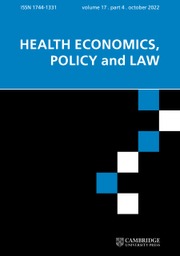Crossref Citations
This article has been cited by the following publications. This list is generated based on data provided by
Crossref.
Boxall, Anne-marie
and
Flitcroft, Kathy
2007.
From little things, big things grow: a local approach to system-wide maternity services reform in the absence of definitive evidence.
Australia and New Zealand Health Policy,
Vol. 4,
Issue. 1,
Cicchetti, A.
Manca, A.
and
Ruggeri, M.
2007.
L’utilizzo di modelli decisionali per le valutazioni economiche dei farmaci in Italia: stato dell’arte e prospettive future.
PharmacoEconomics Italian Research Articles,
Vol. 9,
Issue. 2,
p.
59.
Rogowski, Wolf H
Hartz, Susanne C
and
John, Jürgen H
2008.
Clearing up the hazy road from bench to bedside: A framework for integrating the fourth hurdle into translational medicine.
BMC Health Services Research,
Vol. 8,
Issue. 1,
Milewa, Timothy
2008.
Representation and legitimacy in health policy formulation at a national level: Perspectives from a study of health technology eligibility procedures in the United Kingdom.
Health Policy,
Vol. 85,
Issue. 3,
p.
356.
Cicchetti, A.
Ruggeri, M.
Gitto, L.
and
Mennini, F. S.
2008.
Analisi economica per l’estensione della vaccinazione contro l’influenza agli individui di età 50–64: risparmi sociali e analisi di Budget Impact.
PharmacoEconomics Italian Research Articles,
Vol. 10,
Issue. 3,
p.
137.
Johnson, Ana P.
Sikich, Nancy J.
Evans, Gerald
Evans, William
Giacomini, Mita
Glendining, Murray
Krahn, Murray
Levin, Les
Oh, Paul
and
Perera, Charmaine
2009.
Health technology assessment: A comprehensive framework for evidence-based recommendations in Ontario.
International Journal of Technology Assessment in Health Care,
Vol. 25,
Issue. 02,
p.
141.
COOKSON, RICHARD
DRUMMOND, MIKE
and
WEATHERLY, HELEN
2009.
Explicit incorporation of equity considerations into economic evaluation of public health interventions.
Health Economics, Policy and Law,
Vol. 4,
Issue. 2,
p.
231.
Cicchetti, A.
Ruggeri, M.
Gasbarrini, A.
Cazzato, A.
Di Gioacchino, G.
Navarra, P.
Cauda, R.
and
Romano, G.
2009.
Valutazione costo-efficacia del percorso dei pazienti a rischio di epatite B sottoposti a test anti-HBV.
PharmacoEconomics Italian Research Articles,
Vol. 11,
Issue. 2,
p.
105.
McDaid, David
and
Sassi, Franco
2010.
Evidence‐Based Decisions and Economics.
p.
67.
Brunetti, Massimo
Ruiz, Francis
Lord, Joanne
Pregno, Silvia
and
Oxman, Andrew D.
2010.
Evidence‐Based Decisions and Economics.
p.
114.
Flitcroft, Kathy
Gillespie, James
Salkeld, Glenn
Carter, Stacy
and
Trevena, Lyndal
2011.
Getting evidence into policy: The need for deliberative strategies?.
Social Science & Medicine,
Vol. 72,
Issue. 7,
p.
1039.
Ruggeri, Matteo
Cicchetti, Americo
and
Gasbarrini, Antonio
2011.
The cost-effectiveness of alternative strategies against HBV in Italy.
Health Policy,
Vol. 102,
Issue. 1,
p.
72.
Wilmot, Stephen
2011.
Evidence, ethics and inclusion: a broader base for NICE.
Medicine, Health Care and Philosophy,
Vol. 14,
Issue. 2,
p.
111.
Smith, Neale
Mitton, Craig
Cornelissen, Evelyn
Gibson, Jennifer
and
Peacock, Stuart
2012.
Using evaluation theory in priority setting and resource allocation.
Journal of Health Organization and Management,
Vol. 26,
Issue. 5,
p.
655.
Hughes, David
2012.
Le rationnement équitable des médicaments onéreux au Québec - les critères d’évaluation et principes éthiques.
Éthique publique,
Dakin, Helen
Devlin, Nancy
Feng, Yan
Rice, Nigel
O'Neill, Phill Peter
and
Parkin, David
2013.
The Influence of Cost-Effectiveness and Other Factors on NICE Decisions.
SSRN Electronic Journal,
Dakin, Helen
Devlin, Nancy
Feng, Yan
Rice, Nigel
O'Neill, Phill
and
Parkin, David
2015.
The Influence of Cost‐Effectiveness and Other Factors on Nice Decisions.
Health Economics,
Vol. 24,
Issue. 10,
p.
1256.
Dixon, Padraig
Chamberlain, Charlotte
and
Hollingworth, William
2016.
Did It Matter That the Cancer Drugs Fund Was Not NICE? A Retrospective Review.
Value in Health,
Vol. 19,
Issue. 6,
p.
879.
Coretti, Silvia
Codella, Paola
Romano, Federica
Ruggeri, Matteo
and
Cicchetti, Americo
2016.
COST-EFFECTIVENESS ANALYSIS OF HERPES ZOSTER VACCINATION IN ITALIAN ELDERLY PERSONS.
International Journal of Technology Assessment in Health Care,
Vol. 32,
Issue. 4,
p.
233.
Devlin, Nancy J.
and
Lorgelly, Paula K.
2017.
QALYs as a measure of value in cancer.
Journal of Cancer Policy,
Vol. 11,
Issue. ,
p.
19.


